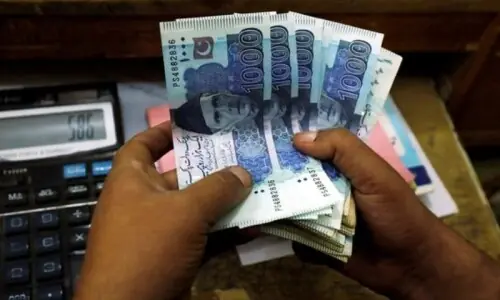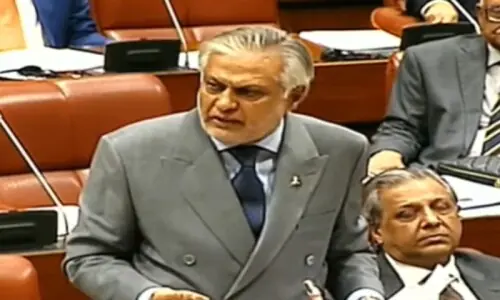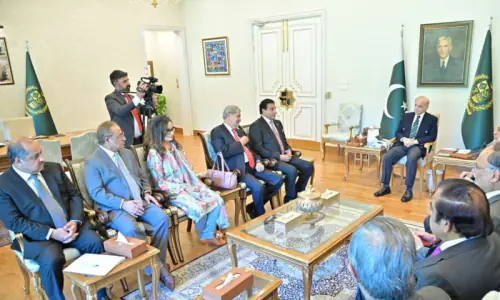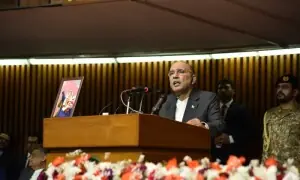
ANYONE who has travelled to another country would know of the discomfort of not speaking or understanding a foreign tongue. Basic questions about directions and transport can suddenly become impossible to get answered. We are forced to rely on more primitive methods of communication, such as gesturing, speaking very slowly, hoping to stumble upon a stray word that will be mutually understandable.
Now imagine being in a court of law. You are the defendant. The documents before you could say anything. You wouldn’t know, you cannot understand what the text says. You’re being talked about, your guilt measured but you have no idea how you or your story is being represented. For all you know, they could be saying you committed a mass murder when you’re really in there for a traffic violation.
For the 2,795 Pakistani prisoners in Saudi Arabia, this is no imagined scenario. Most of them have lived through this reality with terrifying consequences — 62 of them have been beheaded after trials conducted entirely in Arabic, without being provided adequate translation services.
It is precisely these gross violations that new research by Justice Project Pakistan and Human Rights Watch documents. Caught in a Web: Treatment of Pakistani Prisoners in the Saudi Criminal Justice System indicts a system where prisoners are, for all intents and purposes, presumed to be guilty until proven innocent.
Pakistani officials rarely if ever visit Saudi prisons.
The deficiencies manifest in the criminal justice system in both Pakistan and Saudi Arabia can hold dire consequences for the most vulnerable members of society. But in the former, there are still certain provisions in the law, such as the right to a state-appointed attorney, that make it marginally more fair.
About 1.6 million Pakistanis, most of them migrant workers, make up the second-largest migrant community in Saudi Arabia. Pakistan considers Saudi Arabia its closest ally, yet the latter executes more Pakistanis than any other foreign nationality. There is clearly a disconnect between our diplomatic allegiance, and the treatment that is meted out to our citizens.
Long periods of detention without charge or trial, no access to legal assistance, pressure on detainees from the authorities to sign confessions and accept predetermined prison sentences, and ineffective translation services for defendants have emerged as patterns common to a defendant’s journey through the Saudi criminal justice system.
The government has various human rights obligations towards its migrant workers, under both domestic and international laws. Under the Constitution, it must ensure that the fundamental right to security of person (Article 9), safeguard from arrest and detention (Article 10), due process (Article 10A), dignity of man and protection from torture (Article 14) remain protected regardless of where a Pakistani national is resident (Article 4). This is the citizen’s contract with the state – not to commit treason, and be protected by the state wherever they are.
Pakistan falls short of these through its failure to instal a universal consular protection policy. Saudi officials rarely, if ever, complied with the obligation to promptly inform Pakistani consular officials about arrests of Pakistani citizens, and the burden to inform Pakistani authorities largely fell on detainees and family members. Many don’t even know which government agency to contact.
Most Pakistanis involved in criminal cases do not seek consular services from the Pakistani embassy in Riyadh or the consulate in Jeddah at any point during their detentions because they did not believe Pakistani officials would offer assistance. Pakistani officials rarely if ever visit Saudi prisons, unlike representatives of other countries. Defendants who do contact Pakistani embassy officials say they did not provide any assistance, leaving them at the mercy of Saudi courts.
For several months, the Lahore High Court has been ordering the government to draft a consular protection policy. This is not an issue that can be put on hold by buying more time; every day that passes brings more misery to Pakistanis detained abroad and to their families. Pakistan’s failure to put a consular protection policy in place makes it an accomplice to the ordeal faced by these prisoners.
Access to legal representation would be a good place to start, but it must also investigate and prosecute all agencies involved in trapping Pakistanis travelling to Saudi Arabia for job seeking and trafficking them as drug mules. It must educate Pakistani migrant workers about the flaws in Saudi Arabia’s criminal justice system prior to their departure, guiding them about how to navigate the system should they find themselves on the wrong side of the law. It must press upon Saudi authorities to return the bodies of its executed citizens. One detainee remarked during an interview, “No one can help you once you are in jail.”
No Pakistani, stranded in a foreign land, should ever have to feel this way.
The writer is executive director of Justice Project Pakistan.
Twitter: @SarahBelal_
Published in Dawn, March 6th, 2018




























